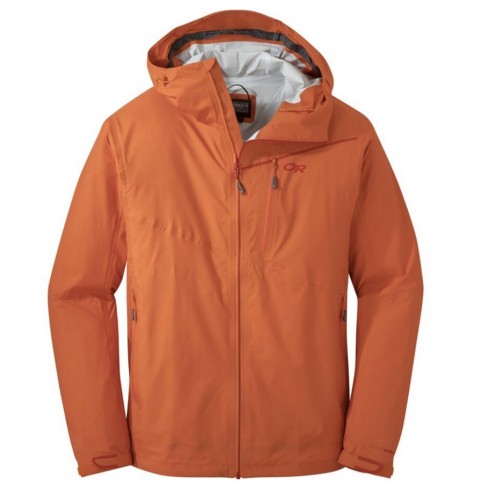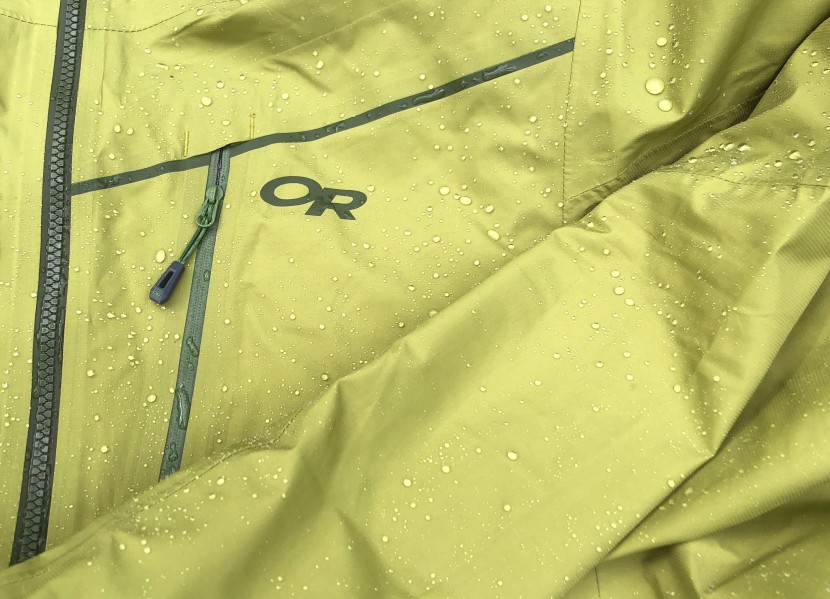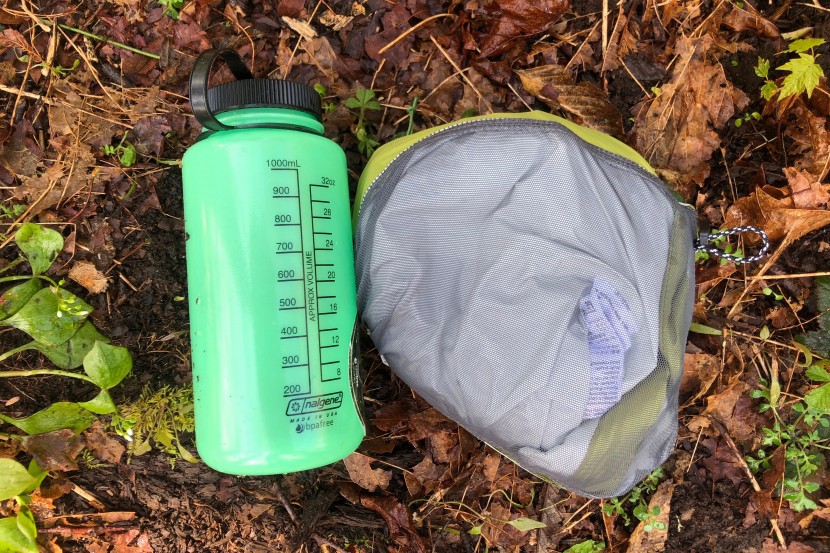Outdoor Research Interstellar Review
Our Verdict
Our Analysis and Test Results
A great across-the-board performer, the Outdoor Research Interstellar is one of those jackets that excels in every metric. It offers some of the better freedom of movement with its stretchy fabric, excellent breathability, and average stormworthiness. All of our testers found the Interstellar to be one of the more versatile jackets as well; it is light and compact enough for backpacking or day hiking but sturdy and breathable enough for multi-day ski touring and mountaineering.
Water Resistance
For its weather resistance, the Interstellar uses Outdoor Research's 3-layer proprietary Ascentshell membrane inside a nylon exterior. Ascentshell, similar to other waterproof but air-permeable fabrics, offers a design where a slight amount of air can pass through the fabric at all times, yet will remain waterproof.
The DWR treatment has been improved for 2019, with the hope it will be longer-lasting and more environmentally friendly. The weather protection is more than adequate for soggy hikes, wet backpacking trips, or other wintery weather situations.
Hood Design
The Interstellar has a moderately deep helmet-compatible hood that cinches in three ways around your head; this accommodates different headwear and head sizes. These cinches are easy to tighten with one hand and loosen with two (or one with a lot of jiggling).
The hood cinch adjustments are well-designed, and when tightened, do a great job of sealing out the elements while moving with you as you turn your head, helping to maintain excellent peripheral vision.
Breathability & Venting
The Interstellar has great breathability and is in line with the best performing models we tested. The Ascentshell fabric is air permeable, meaning unlike most waterproof fabrics, specifically ePTFE (like more Gore-tex and eVent), that you won't have to work up a large amount of heat to create a big temperature differential. This temperature differential is what ensures optimal performance (warmer on the inside than the outside). Instead, this model is always functioning with a small amount of air, which is consistently passing through.
The Interstellar offers almost no features to help move moisture and offers no proper ventilation options. While ventilation options are great, it's worth noting that breathability and layering appropriately are far more important than vents. If it's pouring rain or you find yourself walking on a damp, overgrown trail, opening your vents simply isn't an option, as you may let in more water than the vents allow to escape. This concept is generally why we consider breathability more important than dedicated ventilation features. With that said, this model sports mesh-lined pockets, which make it possible to offload some heat and moisture by unzipping the pockets; however, calling them a true vent would be a bit of a stretch.
Several of our testers were impressed with this jacket during our stationary bike test, where we tested the breathability of each jacket side-by-side. We were noticeably less hot and sweaty, which we verified by wearing this jacket for the full uphill on many skin track ascents. We can say without a doubt that the Interstellar does a great job of keeping us cool and dry, which earned it a high score.
Comfort, Mobility, and Fit
When it came to freedom of movement, it's clear that the Interstellar is a superb model that has been designed with mobility in mind. While it's not as stretchy as the Rab Kinetic Plus, it isn't far off, and the Interstellar offers more stretch than nearly all the others in our fleet. The fabric is soft and subtle, and an excellent option for activities where mobility is key.
Fit
Our lead tester is 5'10", 170 pounds, with a slightly stocky build; he typically wears a medium, and in this case, the fit was spot on or maybe just a tough on the slimmer fitting side. With the medium, he was able to layer a thin puffy, but with nothing but a base layer underneath, the jacket wasn't too baggy. Another tester is 6'0" tall and weighs around 160 pounds, with fairly broad shoulders but a skinnier frame. We ordered a large for this tester, which fit him well. There was more than enough room for layers, and the fit was still excellent if worn without. The Interstellar did not affect or impede movement or vision during testing. We would recommend sizing up if you have wide shoulders or a bigger torso.
Pocket Design
This jacket has two large handwarmer pockets with mesh backing and a single Napoleon-style pocket, which is also mesh-backed. While the handwarmer pockets are accessible with a pack on and zip from the top down (ideal), the waist strap of a pack still sits over the lower portion of the pockets, which is a tad annoying if you're carrying items inside them. Unlike several other models, the zippers were low profile and didn't pinch our tester's hips. We prefer higher handwarmer pockets for their functionality, especially if you are buying this jacket for hiking, backpacking, or climbing.
You'll find a hanging cell phone pouch made of mesh, which is located inside the single chest pocket. We found it challenging to stuff our iPhone 7 (with a moderately-sized Lifeproof case) inside, as it was a touch on the smaller size. We aren't sure what OR was thinking, but it does keep your phone more secure, particularly if you don't have a case on it.
Weight
Our size medium weighed 10.5 ounces, which is slightly below average among products in our review. It does, however, pack in some of the best weather resistance for is weight and is geared toward hiking, backpacking, and climbing. When compared to hardshells on the market, this one is undoubtedly lighter and still offers up adequate performance (as both a rain jacket or hardshell).
Durability
Complete with 20D 100% nylon, the exterior is middle of the road for durability, longevity, and tear resistance. Its DWR held up respectably well and lasted longer than coated waterproof insert models, like the Marmot PreCip, and is on par with most of the stretchy models we tested. It isn't as tear or abrasion resistant as other similarly priced models, like the Arc'teryx Zeta, but this model doesn't offer any stretch.
Packed Size
The Interstellar compresses well and stows conveniently away into a reversible handwarmer pocket. While we wouldn't mind if Outdoor Research made this pocket just a little smaller to minimize the volume this jacket took up, we still appreciate the feature.
Value
It's one of the more expensive models in our review and is one of the costliest products to feature a proprietary fabric (and not a name-brand one like Gore-tex or eVent). While we don't believe that proprietary material is a negative, especially one like Ascentshell with its top-tier breathability and solid storm worthiness, it just isn't a screaming deal. We do think for the function-focused crowd this is a sweet jacket who will find the performance justifies the cost. It is more expensive than the stretcher Rab Kinetic Plus but provides better stormworthiness and is more versatile.
Conclusion
If you're looking for a rain jacket for more aerobic outdoor-oriented activities, an air-permeable one might be just the ticket, thanks to their stretchy feel and top-tier breathability. If you want the best all-around performing air-permeable jacket, look no further than the Outdoor Research Interstellar. The Interstellar offers an adequate level of stretch and durability, and provides breathability and stormworthiness. We think these attributes, plus its lower weight and minimal packed volume, make it one of the best options for the action-focused outdoors person. This versatile jacket will protect its user on short day hikes or week long backpacking trips or mountaineering adventures.


















